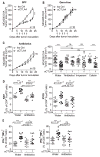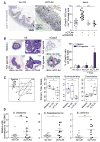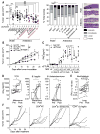Anticancer immunotherapy by CTLA-4 blockade relies on the gut microbiota
- PMID: 26541610
- PMCID: PMC4721659
- DOI: 10.1126/science.aad1329
Anticancer immunotherapy by CTLA-4 blockade relies on the gut microbiota
Abstract
Antibodies targeting CTLA-4 have been successfully used as cancer immunotherapy. We find that the antitumor effects of CTLA-4 blockade depend on distinct Bacteroides species. In mice and patients, T cell responses specific for B. thetaiotaomicron or B. fragilis were associated with the efficacy of CTLA-4 blockade. Tumors in antibiotic-treated or germ-free mice did not respond to CTLA blockade. This defect was overcome by gavage with B. fragilis, by immunization with B. fragilis polysaccharides, or by adoptive transfer of B. fragilis-specific T cells. Fecal microbial transplantation from humans to mice confirmed that treatment of melanoma patients with antibodies against CTLA-4 favored the outgrowth of B. fragilis with anticancer properties. This study reveals a key role for Bacteroidales in the immunostimulatory effects of CTLA-4 blockade.
Copyright © 2015, American Association for the Advancement of Science.
Figures




Comment in
-
IMMUNOTHERAPY. Could microbial therapy boost cancer immunotherapy?Science. 2015 Nov 27;350(6264):1031-2. doi: 10.1126/science.aad7706. Science. 2015. PMID: 26612936 No abstract available.
-
Tumour immunology: Intestinal bacteria are in command.Nat Rev Immunol. 2016 Jan;16(1):5. doi: 10.1038/nri.2015.13. Epub 2015 Dec 14. Nat Rev Immunol. 2016. PMID: 26655627 No abstract available.
-
Gut Microbes May Up PD-1 Inhibitor Response.Cancer Discov. 2017 May;7(5):448. doi: 10.1158/2159-8290.CD-NB2017-039. Epub 2017 Mar 23. Cancer Discov. 2017. PMID: 28336551
References
-
- Peggs KS, Quezada SA, Korman AJ, Allison JP. Curr Opin Immunol. 2006;18:206–213. - PubMed
Publication types
MeSH terms
Substances
Associated data
Grants and funding
LinkOut - more resources
Full Text Sources
Other Literature Sources
Medical

